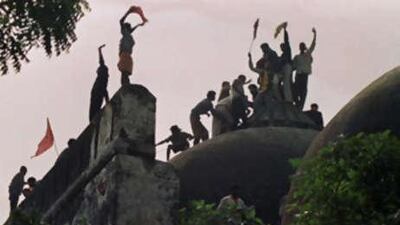LUCKNOW // Government officials are preparing for violence that might erupt when a court issues a ruling tomorrow in a 60-year-old ownership dispute between Muslims and Hindus over the site of a demolished mosque in Ayodhya.
A Hindu mob destroyed the historic 16th-century Babri mosque in 1992. Hindus want to build a temple at the site in the state of Uttar Pradesh because, they believe, their deity Ram had been born there. They say the mosque was built on the ruins of a temple and the land belongs to them. Archaeologists have found no evidence of a temple. Muslims want to rebuild the mosque and are demanding the return of the land, which is now in the government's possession. The Allahabad High Court is to rule which group owns the land.
The demolition of the mosque sparked three months of riots across the country in 1992 and 1993 in which about 2,000 people were killed. Hindu-Muslim riots in Gujarat in 2002 - in which more than 2,000 people, mostly Muslims, are believed to have died - were also linked to the Ayodhya mosque. Last week, the Lucknow bench of the Allahabad High Court rejected a petition to defer the judgment. Officials are worried that it will spark riots and taint India's image leading up to next month's Commonwealth Games. After that decision, the federal and many provincial governments began appealing to Hindus and Muslims to avoid violence.
India's cabinet last week published a notice in national and regional newspapers urging restraint. The appeal, which covered half a broadsheet page and was in several languages, called for both sides to remain calm. "There should be no attempt whatsoever made by any section of the people to provoke any other section or to indulge in any expression of emotion that would hurt the feelings of other people," it said.
Ambika Soni, the information and broadcasting minister, said that the appeal also would be issued on radio and television to reach the remote areas of the country. On Saturday, the country's News Broadcasters' Association issued guidelines to its member television channels asking them to refrain from "sensational, inflammatory and provocative" reporting on the verdict. No channel should speculate on the judgment or its likely consequences, the guidelines said.
Uttar Pradesh has already begun deploying police and paramilitary personnel around the town of Ayodhya and other districts where violence may occur. "The verdict has the potential to spark communal violence and Uttar Pradesh is extremely sensitive in this case," said Brij Lal, a senior police officer in Lucknow. "Yet, we are trying our best to maintain law and order." Authorities in other states such as Madhya Pradesh, Bihar, Gujarat and Maharashtra have assured the central government that their security forces were ready.
Muslim leaders have asked their followers to respect the verdict and support peace. Maulana Khalid Rasheed Firangimahli, a member of the All India Muslim Personal Law Board in Lucknow, said Muslims "should not behave violently if the verdict goes against them. They should not also celebrate if the verdict lands in their favour. "Muslims have been the worst sufferers in all communal riots in the past. They should do their best to avoid confrontation and ignore provocations."
The leaders of both the personal law board and Babri Masjid Action Committee have said they would appeal an unfavourable ruling to the country's highest court. Lal Krishna Advani, the leader of the Hindu-nationalist Bharartiya Janata Party (BJP), said last week his party would determine its next move only after the verdict is delivered. Vinay Katiyar, another senior BJP leader, said "matters of faith cannot be settled in a court", reiterating what many Hindu leaders have said in the past.
"We have to respect the verdict of the court. But I think matters related to religion, sentiments and beliefs cannot be court matters. The government should take an active role in resolving such matters outside the ambit of courts," Mr Katiyar said. But both Zafaryab Jilani, the counsel of the Muslim plaintiff, Sunni Central Waqf Board, and Harishankar Jain, the counsel for the Hindu litigant, Hindu Mahasabha, said several attempts to resolve the case through talks had failed in the past two decades and it is pointless to seek an out-of-court settlement.
"Muslims want to rebuild the mosque at the site and Hindus don't want any Muslim presence in the vicinity," Mr Jilani said. "No party is ready to budge from their stand. At this point only the court can provide the solution." Some Hindus and Muslims say the disputed land should not be handed over to either side. Amit Chatterjee, a Hindu who is a retired college teacher in Kolkata, said he would like to see a memorial park built at the site.
Mohammed Kashif, a businessman in the Uttar Pradesh city of Aligarh, said: "Hindus and Muslims should stop planning to build a temple or mosque at that site. They should unite and establish a small charitable hospital there, to serve poor from all communities." @Email:foreign.desk@thenational.ae

